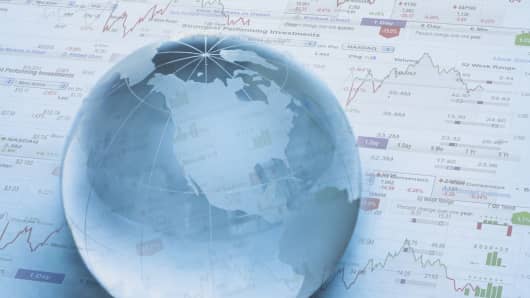It wasn't any better in Asia. The Shanghai Index had its worst day in over a year, closing down nearly three percent. Once again, China is trying to cool inflation; the central bank drained a record amount of cash from its banking system this week, which has the effect of reducing available credit. Yesterday, China's cabinet urged local authorities to put price control targets on new homes.
Australia had worst day in nine months; India its worst day in seven months.
Elsewhere:
1) Has housing peaked? Stifel today downgraded both Home Depot and Lowe's to "hold" from "buy" based on valuation and a potential " 'levelling off' of housing market improvement." It's an odd downgrade, since it goes out of its way to say fourth-quarter results will be strong and "we expect remodels are picking up (MAS suggests this) and appliances are strong."
So what's the problem? Analysts seem desperate to get ahead of the momentum, noting that expectations are high, that home builder sentiment is decelerating, and the recent rise in mortgage rates may be the start of a tailwind.
2) Wal-Mart Stores: A lot of negatives, but the Street prepared for worst. Higher payroll tax, late tax refunds, higher gas prices, colder weather ... what else? It all showed up in the company's report, but the Street was ready for it. Wal-Mart confirmed the weak traffic report that was leaked from an executive email last week in its fourth-quarter earnings report, noting that "February sales started slower than planned, due in large part, to the delay in income tax refunds."
The retailer also confirmed that the higher payroll tax was having an effect: "We are confident that our low prices will continue to resonate, as families adjust to a reduced paycheck and increased gas prices."
But the earnings were not bad at all: $1.67 was 10 cents a share higher than expected. Same-store sales were up one percent, that was at the low end of the one percent to three percent plan. Gross margins were fine. Even guidance for 2013 of $5.20 to $5.40 was close to analysts' estimates of $5.37 a share, though fourth-quarter guidance is below expectations.
The dividend was increased 18 percent; giving Wal-Mart a 2.7 percent yield.
3) Will they never learn? Two congressman are reportedly ready to introduce a financial transaction tax. It was a loser in Sweden, where a transaction tax on stocks and bonds drove business away in the 1980s. Regardless: Europe is seriously debating bringing it back — France has had one since August 2012 — and now Senator Tom Harkin (D.-Iowa) and Representative Peter DeFazio (D.-Oregon) are poised to reintroduce a bill that would impose a 0.03 percent tax on stock and bond transactions. It won't go anywhere.









